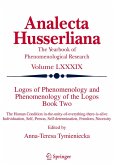The act of thought-thought as an act-would precede the thought thinking or becoming conscious of an act. The notion of act involves a violence essentially: the violence of transitivity, lacking in the transcendence of thought. . . Totality and Infinity The work of Emmanuel Levinas revolves around two preoccupations. First, his philosophical project can be described as the construction of a formal ethics, grounded upon the transcendence of the other human being and a subject's spontaneous responsibility toward that other. Second, Levinas has written extensively on, and as a member of, the cultural and textual life of Judaism. These two concerns are intertwined. Their relation, however, is one of considerable complexity. Levinas' philosophical project stems directly from his situation as a Jewish thinker in the twentieth century and takes its particular form from his study of the Torah and the Talmud. It is, indeed, a hermeneutics of biblical experience. If inspired by Judaism, Levinas' ethics are not eo ipso confessional. What his ethics takes from Judaism, rather, is a particular way of conceiving transcendence and the other human being. It owes to the philosophy of Franz Rosenzweig and Martin Buber a logos of the world and of the holy, which acknowledges their incom mensurability without positing one as fallen and the other as supernal.
Hinweis: Dieser Artikel kann nur an eine deutsche Lieferadresse ausgeliefert werden.
Hinweis: Dieser Artikel kann nur an eine deutsche Lieferadresse ausgeliefert werden.
`Bergo's work is not for novices. However, those familiar with Levinas's thought are likely to find it an astonishingly erudite, even indispensable, reading of his major works as well as a subtle, cogently argued interpretation of the ambiguities, rifts and paradoxes inherent in the relation of ethics to polity.'
The Journal of Speculative Philosophy, 15:1 (2001)
The Journal of Speculative Philosophy, 15:1 (2001)
`Bergo's work is not for novices. However, those familiar with Levinas's thought are likely to find it an astonishingly erudite, even indispensable, reading of his major works as well as a subtle, cogently argued interpretation of the ambiguities, rifts and paradoxes inherent in the relation of ethics to polity.'
The Journal of Speculative Philosophy, 15:1 (2001)
The Journal of Speculative Philosophy, 15:1 (2001)








